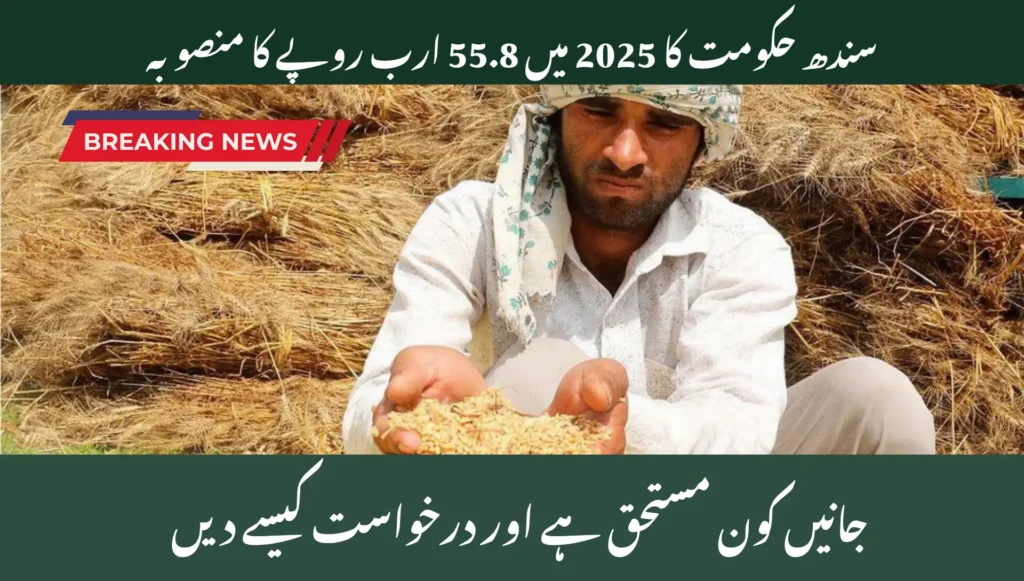Sindh Unveils Rs55.8 Billion Assistance Plan for Small-Scale Wheat Cultivators in October 2025, A Full Guide 2025 on rising input costs for seeds, fertilizers, and labor, uncertain weather conditions and potential crop damage, alongside global economic pressures impacting commodity prices, highlights why the Sindh Government has introduced a pivotal Rs55.8 billion Wheat Farmers’ Relief Policy. This groundbreaking initiative, offering direct cash assistance, subsidized fertilizers, and robust monitoring systems, promises to not only ease the burden on small-scale farmers but also crucially ensure food security for Pakistan’s agricultural sector.
Unlock Crucial Farm Funding
Sindh’s substantial Rs55.8 billion relief package directly counters the financial strain faced by wheat cultivators. Each eligible farmer will secure Rs24,700 per acre, specifically designed to help offset the increasing expenses associated with growing wheat.
This direct financial support ensures timely sowing and promotes the adoption of improved farming techniques, strengthening the rural economy. A key insight reveals that by providing this aid promptly after online registration, the government rapidly injects vital capital into the hands of those who need it most.
Who Qualifies for Support?
The assistance plan targets small-scale cultivators across Sindh, specifically those owning between one and 25 acres of land. Over 411,000 such farmers are expected to reap the benefits of this vital scheme.
Beneficiaries must also be registered in the government’s Benazir Hari Card database and possess valid CNIC and land revenue records. This multi-layered verification system is a crucial safeguard, effectively preventing fraudulent claims and ensuring accountability.
Easy Online Application Steps
Accessing this valuable assistance has been greatly streamlined through a user-friendly digital platform. The online registration process ensures maximum participation for eligible farmers.
- Visit the official portal: Navigate to benazirharicard.gos.pk/form1.php.
- Submit Information: Accurately enter your CNIC number, land records, and up-to-date contact information.
- Verify & Send: Carefully review all entered details for accuracy before submitting your completed application.
- Await Approval: Patience is key as you await the confirmation of your financial aid disbursement.
This simplified online system dramatically reduces manual errors and enhances transparency, eliminating the frustrating long queues once common at administrative offices. An insider’s tip: ensure all digital copies of documents are clear and readable for a smooth application experience.
Ensuring Fair Fertilizer Access
A robust system is in place to guarantee that essential agricultural inputs reach genuine farmers without misuse or diversion. One bag of DAP fertilizer will be distributed per acre by November 2025, followed by two urea bags per acre after January 20, 2026, pending cultivation verification.
To prevent any potential mishandling, all subsidized fertilizer bags clearly bear a “Not for Sale” label, with strict penalties enforceable for any violations. Notably, all provincial, district, and local monitoring committees have cancelled 90-day leaves for agriculture officers, ensuring constant field oversight and support even on Saturdays.
Safeguarding Policy Integrity
The Sindh Government is resolutely committed to preventing any misuse of public funds and resources designated for cultivators. Farmers found misusing the system face a five-year ban from future subsidy programs, a powerful deterrent.
Companies breaching fertilizer distribution regulations will be blacklisted, while any officials caught in maladministration will face immediate disciplinary action. This resolute stance protects the program’s integrity and builds crucial trust within the agricultural community. “This ambitious policy isn’t merely about handouts; it’s about empowering our farmers, securing our harvest, and fortifying our nation’s food independence,” remarked a senior official.
Policy Impact & Future Outlook
Sindh’s innovative relief strategy is poised to significantly reduce reliance on imported wheat, strengthening national food independence. It actively improves the livelihoods of small-scale farmers and offers critical support to agricultural laborers, rejuvenating rural regions.
Backed by key political figures and inspired by a successful 2008 initiative, the current administration continues championing comprehensive subsidies despite strict IMF financial restrictions. This commitment underlines a steadfast dedication to cultivating farmer welfare and ensuring long-term food stability for the country.

FAQs About the Relief Policy
Q1: What are the main objectives of this policy?
A: The policy aims to boost wheat production, reduce import dependency, improve farm livelihoods, and strengthen national food security for Pakistan.
Q2: What happens if an applicant disagrees with the decision on their application?
A: Details regarding an appeals process or contact points for grievances will be made available shortly after the policy’s implementation, ensuring fair recourse for all applicants.
Q3: Are there any support helplines or physical offices for assistance with the online application?
A: Yes, dedicated helplines and designated agriculture offices will provide guidance and support for farmers completing their online registration, ensuring technical assistance is readily available.

